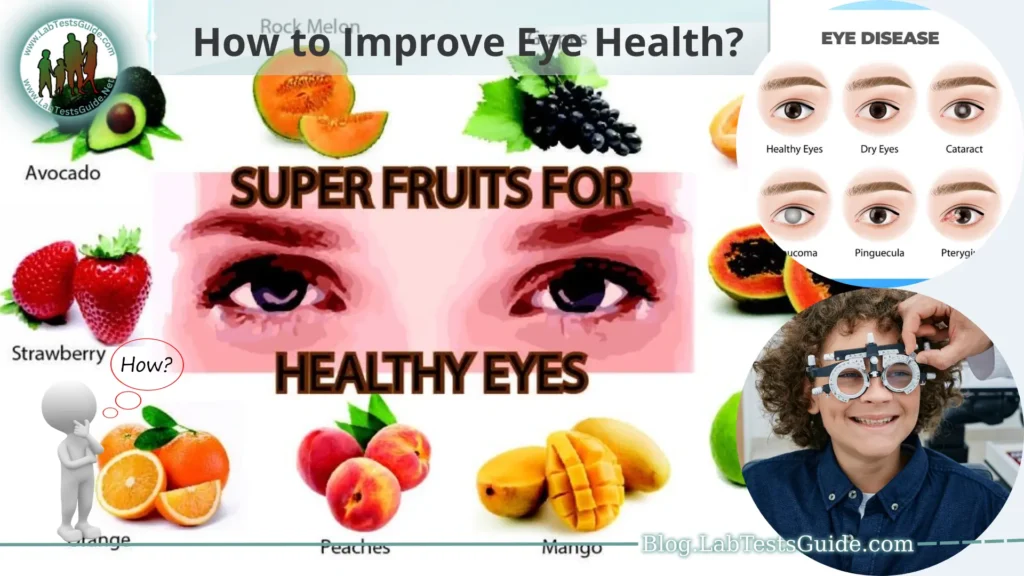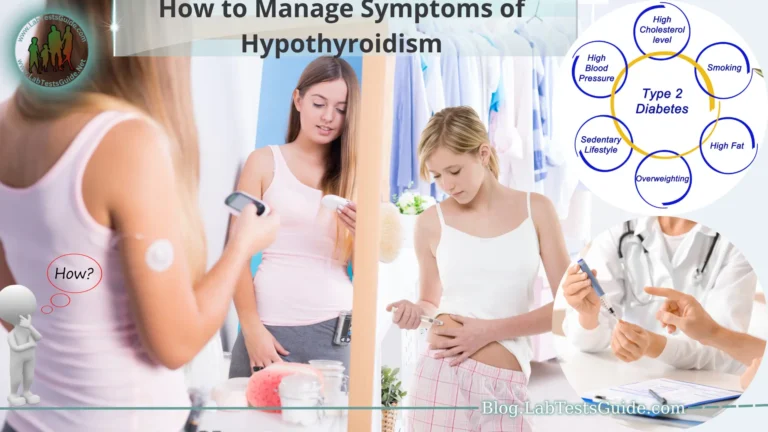Welcome to this comprehensive guide on how to improve your eye health. Your eyes are one of the most precious and vital organs, allowing you to experience the world around you in all its splendor. Taking care of your eyes should be a priority, as good eye health contributes not only to clear vision but also to your overall well-being and quality of life.

In this guide, we will explore various aspects of eye health, including dietary practices that promote better vision, habits to protect your eyes from daily stressors, and the significance of regular eye exams. We’ll discuss how to shield your eyes from harmful elements such as UV radiation and blue light, as well as practical tips for maintaining proper hygiene and eye care. Whether you’re looking for ways to prevent common eye problems or seeking advice on managing chronic eye conditions, this guide has you covered. Remember, prioritizing eye health today can lead to a brighter and clearer vision for years to come. Let’s delve into the essential steps you can take to enhance and preserve the precious gift of sight.
What Is Eye Health and Why Does It Matter?
- Definition of Eye Health: Eye health refers to the overall well-being and proper functioning of the eyes and visual system. It involves maintaining clear vision, preventing eye diseases, and taking care of the delicate structures that enable us to see the world.
- Importance of Vision: Vision is one of our most essential senses, allowing us to navigate the world, recognize faces, read, and enjoy various activities. Good eye health is crucial for maintaining independence, productivity, and overall quality of life.
- Prevention of Eye Conditions: Maintaining optimal eye health can help prevent a range of eye conditions such as cataracts, glaucoma, macular degeneration, and diabetic retinopathy. Regular eye care can aid in early detection and timely treatment of potential issues.
- Impact on Daily Life: Poor eye health can significantly impact daily activities, including reading, driving, and using electronic devices. Taking care of our eyes ensures that we can continue to perform these tasks with ease and comfort.
- Eye Health and Age: As we age, the risk of developing certain eye conditions increases. Regular eye check-ups and adopting healthy habits can help preserve vision and prevent age-related vision problems.
- Relation to Overall Health: The eyes can provide valuable insights into our overall health. Conditions like diabetes, high blood pressure, and autoimmune diseases may manifest early signs in the eyes, making eye exams crucial for identifying potential health issues.
- Psychological and Emotional Well-being: Good eye health can positively impact mental health and emotional well-being. Clear vision enhances self-confidence, independence, and the ability to engage in social activities.
- Economic Impact: Eye health has a significant economic impact, both on individuals and society as a whole. Poor vision can lead to reduced work productivity and increased healthcare costs related to eye diseases.
- Vision in Education: Children with good eye health are better equipped to excel in their studies. Detecting and addressing vision problems early can prevent academic challenges and potential learning difficulties.
- Personal Responsibility: Maintaining eye health is a personal responsibility. Regular eye exams, adopting healthy lifestyle habits, and protecting our eyes from harmful elements are essential steps in preserving clear vision and overall eye well-being.
How to Improve Your Eye Health:
Healthy Diet for Better Vision:
- Consume a diet rich in eye-friendly nutrients like vitamins A, C, E, and zinc.
- Include leafy greens, colorful fruits, and vegetables to promote good eye health.
- Incorporate omega-3 fatty acids found in fish and flaxseed for optimal eye function.
Eye-Friendly Habits for Daily Life:
- Take regular breaks from screens to reduce eye strain (20-20-20 rule: Every 20 minutes, look at something 20 feet away for 20 seconds).
- Ensure proper lighting when reading or using electronic devices to prevent eye fatigue.
- Perform blinking exercises to keep your eyes moist and reduce dryness.
Protecting Your Eyes from Harmful Elements:
- Wear sunglasses with UV protection to shield your eyes from harmful ultraviolet rays.
- Use blue light filters on electronic devices to minimize digital eye strain.
- Wear protective eyewear when engaging in activities that pose a risk of eye injury.
Regular Eye Exams and Vision Care:
- Schedule comprehensive eye exams at least every two years, or more frequently if advised by your eye care professional.
- Address vision problems promptly with glasses, contact lenses, or other vision correction options.
Exercise and Physical Activity for Eye Health:
- Engage in regular physical activity to improve blood circulation, which benefits eye health.
- Perform eye exercises to strengthen eye muscles and enhance focus and coordination.
Maintaining Proper Hygiene and Eye Care:
- Wash your hands thoroughly before touching your eyes to prevent eye infections.
- Follow proper contact lens care guidelines to avoid infections and discomfort.
- Remove eye makeup gently to avoid irritation and potential eye damage.
Managing Chronic Eye Conditions:
- Follow prescribed treatments and medications for conditions like dry eyes or allergies.
- Apply warm compresses to soothe eye discomfort and reduce inflammation.
- Take necessary precautions to manage eye strain caused by excessive screen time.
Importance of Sleep for Eye Health:
- Aim for 7-9 hours of quality sleep each night to allow your eyes to rest and rejuvenate.
- Create a sleep-conducive environment by reducing screen exposure before bedtime.
Avoiding Harmful Eye Practices:
- Refrain from rubbing your eyes, as it can lead to irritation and potential damage.
- Use eye drops as directed and avoid overusing them, as it may worsen symptoms.
Eye Health and Age:
- Recognize age-related changes in vision and seek appropriate eye care.
- Adjust lifestyle habits to accommodate changing vision needs with age.
Healthy Diet for Better Vision:
Here are some key nutrients and eye-friendly foods to incorporate into your diet for better vision.
Vitamin A:
- Found in: Carrots, sweet potatoes, spinach, kale, butternut squash, and liver.
- Benefits: Essential for maintaining good night vision and overall eye health.
Vitamin C:
- Found in: Citrus fruits (oranges, lemons), strawberries, kiwi, bell peppers, and broccoli.
- Benefits: Helps in reducing the risk of cataracts and slowing down age-related macular degeneration (AMD).
Vitamin E:
- Found in: Nuts (almonds, hazelnuts), seeds (sunflower seeds), spinach, and fortified cereals.
- Benefits: Works as an antioxidant that helps protect the eyes from oxidative damage.
Zinc:
- Found in: Red meat, poultry, oysters, beans, nuts, and whole grains.
- Benefits: Aids in the absorption of Vitamin A and contributes to the health of the retina.
Omega-3 Fatty Acids:
- Found in: Fatty fish (salmon, tuna, mackerel), flaxseed, chia seeds, and walnuts.
- Benefits: Reduces the risk of dry eyes and helps maintain overall eye health.
Lutein and Zeaxanthin:
- Found in: Spinach, kale, collard greens, broccoli, and eggs.
- Benefits: These antioxidants protect the eyes from harmful high-energy light waves like ultraviolet rays.
Bioflavonoids:
- Found in: Citrus fruits, berries, and tea.
- Benefits: Helps in maintaining the structural integrity of the blood vessels in the eyes.
Antioxidants:
- Found in a variety of fruits and vegetables like berries, tomatoes, and dark leafy greens.
- Benefits: Protects the eyes from free radicals and oxidative stress.
Eye-Friendly Habits for Daily Life:
Here are some practical habits you can incorporate into your routine.
Take Regular Breaks from Screens:
- Follow the 20-20-20 rule: Every 20 minutes, look at something 20 feet away for 20 seconds to give your eyes a rest from screen time.
- Reduce screen glare by adjusting brightness and contrast levels on your devices.
Ensure Proper Lighting Conditions:
- Use appropriate lighting when reading or working on tasks to avoid eye strain. A well-lit room with diffused light is ideal.
- Avoid reading in dim light or excessive brightness, as both can strain your eyes.
Perform Blinking Exercises:
- Blink frequently to keep your eyes moist and prevent dryness, especially when using digital devices for prolonged periods.
- Consider using artificial tears or lubricating eye drops if you experience dry eyes regularly.
Maintain a Comfortable Workstation:
- Position your computer monitor or screen at eye level and about 20 inches away from your face to reduce eye strain.
- Adjust the screen’s brightness and contrast to a comfortable level.
- Practice Eye Relaxation Techniques: Every hour, take a few minutes to close your eyes and practice deep breathing to relax your eye muscles and reduce tension.
- Use Blue Light Filters: Enable blue light filters on your electronic devices, or use blue light-blocking glasses to minimize digital eye strain and sleep disturbances.
- Stay Hydrated: Drink plenty of water throughout the day to maintain eye moisture and prevent dry eyes.
- Wear Protective Eyewear: Use safety goggles or protective eyewear when participating in activities that could pose a risk of eye injury, such as sports or DIY projects.
- Avoid Smoking: Smoking can increase the risk of developing eye diseases like cataracts and macular degeneration. Quitting smoking can have significant benefits for eye health.
Control Allergens and Irritants:
- Keep your living space clean and dust-free to minimize potential eye irritants.
- Manage allergies with appropriate medications and avoid rubbing your eyes.
Protecting Your Eyes from Harmful Elements:
Here are some essential steps to protect your eyes from potential harm.
Wear Sunglasses with UV Protection:
- Invest in high-quality sunglasses that offer 100% UV protection.
- Sunglasses protect your eyes from harmful ultraviolet (UV) rays, which can lead to cataracts, macular degeneration, and other eye issues.
Use Blue Light Filters on Digital Devices:
- Blue light emitted from electronic devices like smartphones and computers can strain your eyes and disrupt sleep patterns.
- Consider using blue light filters or special glasses that block blue light to reduce digital eye strain.
- Protect Your Eyes during Outdoor Activities: Wear appropriate eye protection, such as safety goggles or sports-specific eyewear, when engaging in outdoor activities like sports, DIY projects, or yard work.
- Take Precautions in Hazardous Environments: If you work in an environment with potential eye hazards (e.g., construction sites or industrial settings), use appropriate safety goggles or face shields to protect your eyes from debris, chemicals, or particles.
Keep Your Eyes Moist in Dry Environments:
- Dry and dusty environments can lead to eye irritation and discomfort.
- Use lubricating eye drops to keep your eyes moist and prevent dryness, especially in arid or air-conditioned settings.
- Avoid Direct Gazing at the Sun: Never look directly at the sun, even during solar eclipses, as it can cause permanent eye damage, including solar retinopathy.
- Maintain Good Contact Lens Hygiene: If you wear contact lenses, follow proper hygiene and care guidelines to reduce the risk of eye infections and complications.
Take Breaks from Screen Time:
- Prolonged screen time can cause digital eye strain and discomfort.
- Follow the 20-20-20 rule: Take a 20-second break every 20 minutes to look at something 20 feet away to give your eyes a rest.
Adjust Lighting Conditions:
- Ensure adequate lighting when reading or performing tasks to prevent eye strain.
- Avoid using devices or reading in dark or excessively bright conditions.
Avoid Smoking and Secondhand Smoke:
- Smoking can increase the risk of eye diseases like cataracts and macular degeneration.
- Steer clear of secondhand smoke, as it can also harm your eyes and overall health.
Regular Eye Exams and Vision Care:
Here’s why regular eye exams and vision care are crucial.
Early Detection of Eye Conditions:
- Regular eye exams can detect eye conditions and diseases in their early stages when they are more treatable and manageable.
- Common conditions that can be detected early include cataracts, glaucoma, macular degeneration, and diabetic retinopathy.
Vision Correction:
- Eye exams help determine if you need vision correction, such as glasses or contact lenses, to improve your visual acuity and clarity.
- Wearing the appropriate prescription lenses can significantly enhance your quality of life and productivity.
Monitoring Eye Health:
- Eye exams allow eye care professionals to monitor changes in your eye health over time.
- Tracking your eye health can help identify potential risks or deterioration, enabling timely interventions.
Prevention of Serious Eye Issues:
- Detecting and managing eye problems early can prevent severe visual impairment or blindness.
- Regular eye exams can help preserve your sight and reduce the risk of long-term complications.
Tailored Eye Care Plans:
- Eye care professionals can create personalized eye care plans based on your individual needs and health history.
- These plans may include lifestyle recommendations, eye exercises, and appropriate treatments or interventions.
Vision Assessment for Children:
- Regular eye exams are vital for children to ensure their vision develops properly.
- Early identification and correction of vision issues can prevent learning difficulties and promote healthy visual development.
- Management of Chronic Eye Conditions: If you have chronic eye conditions like dry eyes or eye allergies, regular eye exams allow for ongoing management and adjustments to your treatment plan.
Update in Prescription:
- Our vision can change over time due to factors like age, health conditions, and lifestyle habits.
- Regular eye exams ensure that your prescription remains up-to-date, allowing you to have the clearest vision possible.
- Eye Care for Different Life Stages: Eye care needs may vary at different stages of life, and regular eye exams can address age-specific concerns and provide appropriate care.
- Overall Health Assessment: Eye exams can offer insights into your overall health, as certain health conditions may manifest early signs in the eyes.
Exercise and Physical Activity for Eye Health:
Here’s how exercise and physical activity positively impact eye health.
Improved Blood Circulation:
- Regular physical activity improves blood circulation throughout the body, including the eyes.
- Better blood flow to the eyes ensures they receive essential nutrients and oxygen, promoting optimal eye function.
Reduced Risk of Eye Diseases:
- Regular exercise is associated with a lower risk of developing certain eye conditions, such as age-related macular degeneration (AMD) and glaucoma.
- Studies have shown that active individuals have a reduced risk of developing eye diseases compared to those with a sedentary lifestyle.
Management of Diabetes:
- Exercise plays a crucial role in managing diabetes, which is a significant risk factor for diabetic retinopathy – a serious eye condition that affects people with diabetes.
- By helping regulate blood sugar levels, exercise can reduce the risk and severity of diabetic eye complications.
- Lowered Risk of High Blood Pressure: Regular physical activity helps lower blood pressure, reducing the risk of hypertensive retinopathy – a condition caused by high blood pressure affecting the blood vessels in the retina.
- Better Ocular Fluid Dynamics: Exercise may help maintain proper ocular fluid dynamics, potentially reducing the risk of conditions like glaucoma that are related to increased intraocular pressure.
- Prevention of Computer Vision Syndrome: Exercise can help reduce the risk of computer vision syndrome, a condition caused by prolonged screen use, leading to symptoms like eye strain, dry eyes, and headaches.
Overall Eye Health and Function:
- Engaging in a variety of physical activities promotes general health, which positively impacts eye health.
- Staying physically active supports the function of the entire visual system, including eye muscles and coordination.
- Weight Management: Regular exercise is essential for weight management, and maintaining a healthy weight can lower the risk of obesity-related eye conditions like cataracts.
- Outdoor Activities and Vision: Spending time outdoors and engaging in physical activities like walking or hiking allows for a broader range of visual stimuli and helps prevent nearsightedness (myopia).
- Stress Reduction: Exercise is known to reduce stress, and lower stress levels can help reduce eye strain and tension-related eye discomfort.
Importance of Sleep for Eye Health:
Eye Moisture and Lubrication:
- During sleep, the eyes naturally replenish moisture and tears, preventing dryness and irritation.
- Adequate tear production during sleep helps protect the eyes from infections and foreign particles.
Eye Muscle Relaxation:
- While asleep, the muscles around the eyes, including those responsible for focusing and moving the eyes, get a chance to relax and recover from the day’s strain.
- This relaxation helps reduce eye fatigue and discomfort experienced during waking hours.
Cornea Repair and Nourishment:
- During deep sleep, the cornea, the transparent outer layer of the eye, undergoes repair and regeneration.
- Quality sleep ensures proper nourishment and oxygen supply to the cornea, maintaining its clarity and health.
Reduced Eye Strain and Digital Eye Fatigue:
- Sufficient sleep helps prevent digital eye strain caused by prolonged screen time and reduces eye fatigue related to near work.
- Consistent sleep patterns can improve overall eye comfort and visual performance during daily activities.
- Restoration of Vision: Adequate sleep allows the eyes’ light-sensitive cells to rest and recuperate, leading to sharper and clearer vision upon waking.
- Eye Health and Glaucoma: Research suggests that inadequate sleep or poor sleep quality may be associated with an increased risk of glaucoma, a condition characterized by damage to the optic nerve.
- Eye Pressure Regulation: During deep sleep, the intraocular pressure (pressure inside the eyes) may decrease, allowing the eyes to relax and maintain their shape properly.
- Prevention of Eye Twitching and Spasms: Adequate restorative sleep can help reduce or prevent involuntary eye twitching or spasms, known as myokymia.
- Connection to Overall Health: Poor sleep patterns have been linked to various health conditions, including diabetes and high blood pressure, which can affect eye health and increase the risk of eye diseases.
- Optimal Health and Immune Function: Good sleep is essential for overall health and immune system function, which indirectly contributes to eye health by preventing infections and inflammation.
FAQs:
How often should I get my eyes checked?
It is generally recommended to have a comprehensive eye exam every two years for adults with no known eye issues. However, if you have existing eye conditions, wear glasses or contact lenses, or have a family history of eye diseases, more frequent exams may be necessary. Children should have their first eye exam at around 6 months of age, followed by additional exams at ages 3 and 5, and then as recommended by their eye care professional.
What are the signs of an eye infection, and when should I see a doctor?
Signs of an eye infection may include redness, itching, swelling, discharge, increased tear production, sensitivity to light, and blurred vision. If you experience any of these symptoms or suspect an eye infection, it is essential to seek medical attention promptly to prevent potential complications.
Can I improve my vision naturally without glasses or contact lenses?
While some eye exercises and vision training techniques may improve eye coordination and focus, they may not correct refractive errors that require glasses or contact lenses for clear vision. Vision correction options, like glasses or contacts, are prescribed based on individual visual needs and may still be necessary even after trying natural vision improvement techniques.
Are there any foods or supplements that can enhance my eye health?
Yes, certain nutrients like vitamins A, C, E, zinc, omega-3 fatty acids, lutein, and zeaxanthin are beneficial for eye health. Foods rich in these nutrients, such as leafy greens, colorful fruits, vegetables, fish, nuts, and seeds, can support optimal eye function. In some cases, supplements may be recommended, but it’s best to consult with an eye care professional or a registered dietitian before starting any supplements.
How can I prevent digital eye strain from prolonged screen use?
To prevent digital eye strain, follow the 20-20-20 rule: Take a 20-second break every 20 minutes and look at something 20 feet away to give your eyes a rest. Ensure proper lighting and positioning of screens, use blue light filters, and maintain an appropriate distance from screens to reduce eye strain.
Can smoking affect my eye health?
Yes, smoking is harmful to eye health. It increases the risk of developing eye conditions like cataracts, macular degeneration, and optic nerve damage. Quitting smoking can have significant benefits for your eyes and overall health.
How can I protect my eyes from the sun’s harmful UV rays?
Protect your eyes from UV rays by wearing sunglasses with 100% UV protection. Look for sunglasses that block both UVA and UVB rays. Wearing a wide-brimmed hat can also provide additional protection for your eyes and the delicate skin around them.
At what age should children start wearing sunglasses for eye protection?
Children should start wearing sunglasses with UV protection from an early age. The eyes of children are more susceptible to damage from UV rays, so it’s essential to protect their eyes with proper sunglasses when outdoors.
Can a healthy diet improve my vision?
A healthy diet rich in eye-friendly nutrients can contribute to better eye health, but it may not directly improve refractive errors like nearsightedness or farsightedness. However, a balanced diet can support overall eye function and reduce the risk of certain eye conditions.
When should I seek immediate medical attention for an eye injury?
Seek immediate medical attention for any eye injury, no matter how minor it may seem. Even seemingly minor injuries can lead to serious complications if not promptly treated. Do not rub or put pressure on the injured eye, and avoid using over-the-counter eye drops before consulting a healthcare professional.
Conclusion:
In conclusion, taking proactive steps to improve and maintain eye health is of utmost importance. By incorporating a healthy diet rich in eye-friendly nutrients, practicing eye-friendly habits in daily life, protecting our eyes from harmful elements, and ensuring regular eye exams and vision care, we can safeguard our precious gift of sight. Additionally, recognizing the significance of sleep for eye health and staying physically active to support overall well-being contributes to the overall health of our eyes. Remember, prioritizing eye health and seeking professional care when needed can lead to clearer vision, reduced risk of eye conditions, and a better quality of life for years to come. Let’s make eye health a priority and continue to cherish the world through the windows of our eyes.






